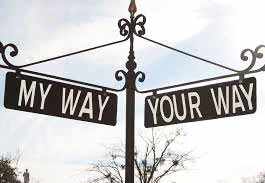 By Jodi Baretz
By Jodi Baretz
Conflicts can be personal, community-based, global. They can cover all sorts of topics and divide us in a variety of ways. Conflict is part of the human condition, and, while inevitable, is healthy and normal too. However, just as we all experience conflict in different and unique ways, so too do we go about resolving our issues using a variety of methods and manners. Often, it is not the conflict itself, but the resolution process that determines the outcome and impacts our ongoing thoughts and feelings.
Gathering ideas from different viewpoints can be informative and helpful. Town meetings and, more recently, social media are great ways to share ideas and come together; however, there are challenges as well. Emotions and tensions can run high at the meetings, and words and posts can be misconstrued on social media.
Social media is a wonderful resource, but it can also be a place where tension and conflict arise. Local online forums (whether Chappaqua, Armonk, Mount Pleasant or others) reflect community interest in a range of helpful to hot-button topics such as coyotes, community pools, dog curbing, train track crossings and future developments like that of Chappaqua Crossing. It is wonderful that we all have opinions, but pausing to think about how we express them is critical.
When we respond too quickly, based on emotion, we often regret it. Creating space between stimulus and response can make a huge difference. Victor Frankl, author of Man’s Search for Meaning, writes: “Between stimulus and response there is a space. In that space is our power to choose our response. In our response lies our growth and freedom.” Before you respond to conflict, you may want to stop and ask yourself–am I being clear and respectful? What am I really reacting to here? Is it the issue itself or is this personal? When have I felt like this before? Craig Ferguson, late-night host and comedian, had this to say on communicating with his ex-wife: He asks himself, “does this need to be said, does this need to be said by me, does this need to said by me right now?”
The ability to create space sounds great in theory, but in the moment can be difficult to attain. It takes a lot of practice and we are always a work in progress. Personally, I work on this through meditation and mindfulness, but still have moments where I forget to pause. Just recently, I reacted to a situation, without the pause, and ended up hurting someone I care about and regretting my actions. After apologizing, I immediately tried to use this experience as a way to understand myself and uncover what triggered me. Even though it was a less than ideal response, it was an opportunity to examine my behavior in a compassionate non-judgmental way, understand that I am human and that I make mistakes. Hopefully, this will lead to growth, healing and forgiveness, and it won’t happen again.
We all have different triggers depending on our past experiences and how we were raised. People can have varying reactions to the exact same stimulus. We tend not to be open to new ideas and beliefs and only really “see” the ones that we agree with, what we already know to be true. If we can drop our ego when conflict arises, and try to understand what exactly we are reacting to, as well as the other viewpoint, we will be more effective at coming to a resolution. Understanding, rather than accusing, goes a long way in conflict resolution. This does not mean you have to agree with the other side or condone their viewpoint or actions. We are usually protecting something that means a lot to us when we are fighting for it; for example, it is likely that a wildlife conservationist and small dog owner will have different opinions regarding the coyotes in our midst. Opening to what the other person is fighting for can really help with reaching a compromise. It will make you more effective in your position. Can we learn to see our experiences through a wider lens?
When we engage in conflict and get angry at others, it often results in stress and inner turmoil. We want to get our point across, but when we fight, we end up harming ourselves. We may feel wronged, disrespected, misunderstood, but holding on to anger and hostility can affect us more than our adversary. I tell my clients to try to let things go and forgive selfishly. Nelson Mandela once said, “Resentment is like drinking poison and hoping it kills your enemies. “
The open exchange of ideas is what all relationships are built upon. Understanding another’s perspective makes us better leaders and more effective problem solvers. Thinking about why we are triggered by certain issues can be useful, give us insight, and help us respond rather than react. Coming together, we accomplish more; cooperation rather than discord. In the end, we want the same thing, a prosperous vibrant community.
Jodi is a psychotherapist and holistic health coach with a private practice at The Center for Health and Healing in Mt. Kisco. She runs a variety of mindfulness workshops and small groups. Jodi helps “stressed out” adults manage the challenges of daily life and build harmonious relationships with their kids, spouses, bodies and themselves, so they live with more joy, peace and fulfillment.
